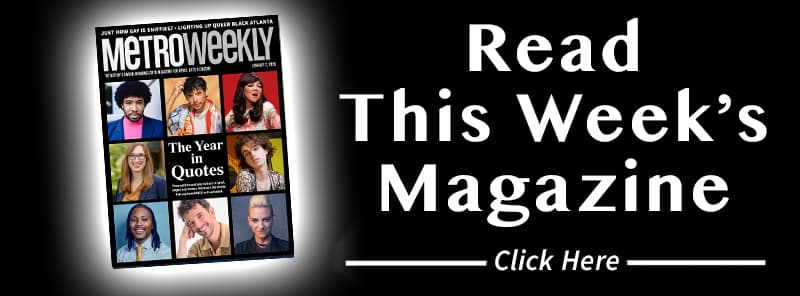Heartfelt
With ''The Normal Heart,'' Arena Stage is putting Patrick Breen and Luke Macfarlane -- two out LGBT actors -- center stage
BREEN: And then, the truth is, George says this a lot, they become one animal. Even if there’s someone who really enjoys laughing a lot, he gets cowed or she gets cowed into not laughing if the audience is quiet. That doesn’t mean they’re not enjoying it. Some of our most enthusiastic curtain calls have been quiet houses over the weekend, Sunday afternoon. Really quiet, and then roaring at curtain. ”Now you give us this?”
MW: We didn’t realize you liked it!
BREEN: We gave up on you guys in Act 1.
MACFARLANE: You’re all sort of masochist-y. You like to cry more than you like to laugh. The play – the first act is so different from the second act, when this monster comes to visit and stays around for a while.
MW: Being in this performance, knowing the place that the show comes from, how does it impact you? Is it just a role?
BREEN: I believe in the message of the play. One of the wonderful things that they’ve done is that they’ve asked us if we’ve had friends who have died of AIDS, and their names are on the screens behind us. Everybody involved in the production has names up on there if they knew someone who died of AIDS. So I personally feel that I’m performing for them, giving voice to their voices that have been stopped. That makes me fight harder for this.
The idea that I think Larry was so prescient about, the idea of gay marriage now in this country, that he ends the play with a gay marriage. There are references throughout the play: ”Why didn’t you guys fight for the right to get married instead of the right to legitimize promiscuity?” Tommy Boatwright says, ”Maybe if they had let us get married in the first place none of this would have happened.”
The fact that that is now – it’s not a tsunami, but it’s a tide coming in. Things are changing. Obama saying that he’s for gay marriage, the president saying that. Whereas Bill Clinton signed the Defense of Marriage Act. That’s extraordinary change in a very brief time.
I identify as one of the LGBT people. So, in that this play argues for cultural recognition, marriage recognition and is a kind of – it becomes, the wall becomes like any other war memorial in this city, the Vietnam War Memorial. It’s a eulogy and a memorial, this play, for the victims of AIDS, and, you’ve read the letter that Larry passes out at the end of the play: It’s not over; people are still getting infected. The more it’s just a sexual – that promiscuity is the way you identify as a gay man, that leads to death, just as silence does.
The more we go, ”Guess who is gay? Guess what show you like, guess who’s gay on that show?” Anybody who’s ever had sex with someone of the same gender, even if you were just experimenting in college, they need to come forward and say it. Just say it. Just tell everybody who you fucked, and that it’s all part of the Kinsey scale – people are straight, gay, and there’s a lot of more gray than we admit – then you’ve made some change in people’s minds. Be heard. Be visible.
That’s why that incredible Proust speech is so powerful to say because it’s so contemporary. He wrote it in ’85, but it’s like: We are there. We are there. We are all through history.
I’ve been watching all these documentaries: Outrage, about all the politicians. Crist and Mayor Koch and shit like that. Everybody. All the gay staffers. Guess what America? We’re here, and we’re running your country.
MW: When you talk about the importance of everybody coming out, regardless of the specifics – looking at you, identifying as bi.
BREEN: And there’s more gay actors coming out, which is great. Jim Parsons just put it in his interview and the guy on White Collar. I’m not outing anybody, he’s out –
MW: Matt Bomer.
BREEN: Yeah. I was talking to an actor who was in town recently, and I can’t say his name, but, I was encouraging him to speak about it to the press, and he was like, ”I’m waiting for somebody to ask me, but nobody does.” And, I’m like, ”Well, then you have to volunteer. You know what I mean.”
MACFARLANE: That’s the amazing thing. People feel like, they keep waiting for, ”When I get to this certain point in my career and then I’ll do it,” then, ”When I get to this next point.” The truth is most people, when they’re at the height of their career —
BREEN: They’re the most afraid to lose it.
MACFARLANE: They’re the most afraid to do it, they never do it, and then they do it all these years later, and no one gives a shit and quite frankly it doesn’t matter.
MW: Was there a point that you made a decision that you would be out?
MACFARLANE: Yeah. And it actually really was a decision. It was clearly a choice. And it has to be a choice. It was quite simple, I was at a point in my career where I was starting to get asked. I had done a television series before, and it was the first time I had ever really experienced the press barrage. It was a political show, it was set in the war in Iraq and I played a soldier in Iraq. And it just never came up. Yet, I always felt this anxiety around any kind of interview. There was always this notion that it was kind of in the room and it could just pop out, so I always felt on guard and it was a terrible, terrible feeling that started to affect my life on set in a major way.
So, what happened with Brothers and Sisters was I started from, ”Oh, it’s going to happen again. I’m going to feel that sort of bizarre anxiety, so I’m just going to get it out of the way.” In an effort, I swear to God, to make my life more simple. Yes, it does look like a political act, but it wasn’t. It really was in an effort to make my life more streamlined, to sort of remove as much anxiety from those interviews as possible.
And it did that, for the most part. Except for now I feel rage because I just wish everybody else would do it. Because I can’t stand being the only person who answers the fucking questions. I’m like, ”There’s so many of you guys out there. Say something. Do something.”
BREEN: And you have to take a hit. I think people who come out in this climate, their careers are still going to suffer. I think they’re going to not get the auditions, there’s just going to be less consideration.
MACFARLANE: And, I don’t think that that is because people are evil and homophobic. I just think people are afraid and ignorant. And there’s a distinction in my mind about that.
BREEN: I’ll give you that.
MW: How so?
MACFARLANE: I don’t believe that people are saying, ”Don’t hire him because he’s gay.” It’s sort of just like, ”He’s gay. This is what gay looks like, and that’s not what I want in my role.” So, the more people come out and you go, ”Oh, gay doesn’t just look like this, it looks like this.” And then it becomes easier. They’re walking around with their notions of what gay means, and it’s very small. Because, throughout history, the kind of gay people that we’ve seen and understood, and been sort of identified in the media, have been small.
We need sports players. Politicians. Where are the gay athletes? You’re trying to tell me that in all the major leagues out there, there aren’t gay players? It’s actually fascinating to me that that is like the last realm. It’s very interesting now, with the military, to see this version of ”gay” coming out.
MW: There are just so many stories, and so many of them look so different than what you think they look like.
MACFARLANE: I think it’s so hard, and I think that this is a bigger conversation, but I think at the end of the day, so many gay people still walk around with this feeling like, ”These feelings that I had when I was a little kid were really confusing and weird” – and they are connected to sex. And those things are still shameful to so many people, so you’re afraid of saying them out loud because we were taught you just don’t talk about sex. It’s still so much connected to the simplicity of the shame that surrounds sex, and I just hope that goes away.
It’s exactly what you were saying about people that made out with a dude when they were in college. If they just came out. Start to sort of erase some of that shame around sex.
And, I’m not talking about a full-on sexual revolution, Part 2. I’m talking about –
BREEN: Openness, honesty, acceptance.
MACFARLANE: Yeah.
BREEN: Even if there is a little repression, it’s also money and movies. People who put up $50 million, they don’t want anything that’s going to make them lose a little of their audience. So, if they say, ”How do I have an openly gay man play a straight man with, say, Jennifer Garner, and if there’s going to be a certain amount of people who won’t see that movie because they think, ‘How can that guy?’ then I won’t make the movie.” Even just a tad, it’s a business decision. Pure, flat-out business.
So, that’s why this generation of people that come out are going to be the Jackie Robinsons. And you’re going to take the hit.
It’s not a small hit, to your money, to your security, to all that stuff. We will see whether Neil Patrick Harris gets another straight role. Or Bomer – he’s so beautiful. I feel like the bigger the pool of people that is, the more people are just going to say, ”Who cares? Can you act?”
Arena Stage presents The Normal Heart to July 29 in the Kreeger Theater, 1101 6th St. SW. For tickets, $40 to $94, call 202-547-1122 or visit arenastage.org.
Support Metro Weekly’s Journalism
These are challenging times for news organizations. And yet it’s crucial we stay active and provide vital resources and information to both our local readers and the world. So won’t you please take a moment and consider supporting Metro Weekly with a membership? For as little as $5 a month, you can help ensure Metro Weekly magazine and MetroWeekly.com remain free, viable resources as we provide the best, most diverse, culturally-resonant LGBTQ coverage in both the D.C. region and around the world. Memberships come with exclusive perks and discounts, your own personal digital delivery of each week’s magazine (and an archive), access to our Member's Lounge when it launches this fall, and exclusive members-only items like Metro Weekly Membership Mugs and Tote Bags! Check out all our membership levels here and please join us today!






















